#but first and foremost it is a biography
Text
All the people that think Oppenheimer is a propaganda movie actually make me laugh, because it is propaganda! Just not the nationalistic/patriotism kind.
It’s literally about a guy that lives to regret his most renowned invention, who wished more than anything it wouldn’t become a weapon, and when faced with his own guilt is told to suck it up and fake a smile.
This movie is trying to get the audience to understand the plight of the scientist that feels like he invented death. He was manipulated time after time by the US military and government, and truly was used for his genius more than he “used” anyone.
It is a 3 hour movie of pain, regret, and opposition between scientific progress and moral implications of doing so.
Don’t shit on a fucking movie because you read a tumblr post about it. Do your own fucking research and maybe go see the movie before you lay such harsh judgement on it.
#oppenheimer#oppenheimer movie#cillian murphy#propaganda#nationalism#fascism#movie review#it’s actually a truly thought provoking and interesting movie#it is one of the only movies that brings to light the idea that the US government is using scientists#and by doing so teaches the wide majority of us citizens that they cannot just blindly trust the military and their government#it teaches a new narrative that the old folks of this country haven’t considered because they’re so knee deep in nationalism#really this movie has so many benefits#but first and foremost it is a biography#(or narrated autobiography?)#but like it’s also not#ALSKDKKDKFKFKF kd#please just go see the movie before you make huge jusegenent passes on it
19 notes
·
View notes
Text

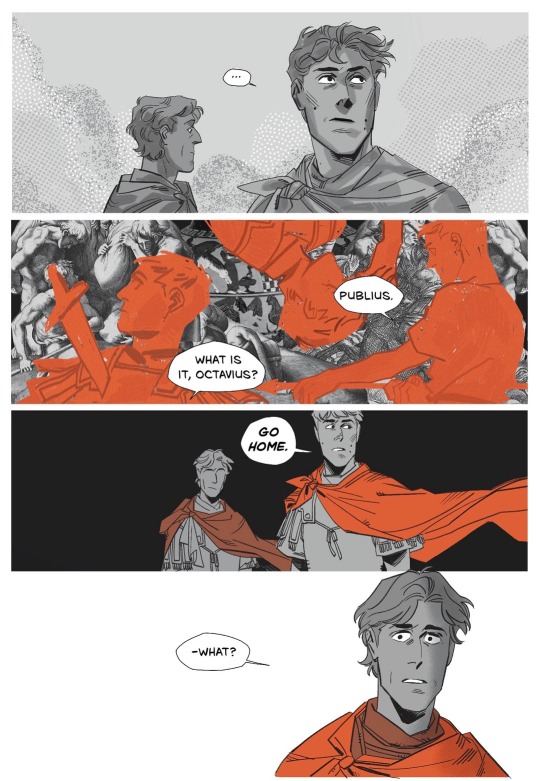
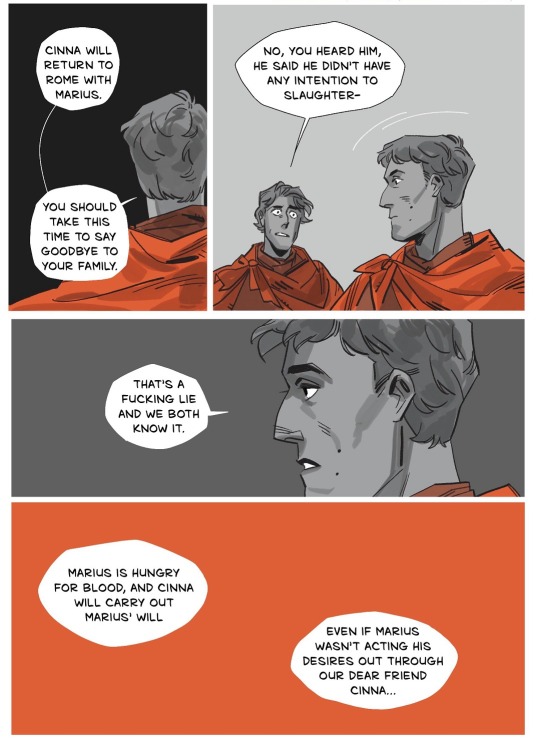
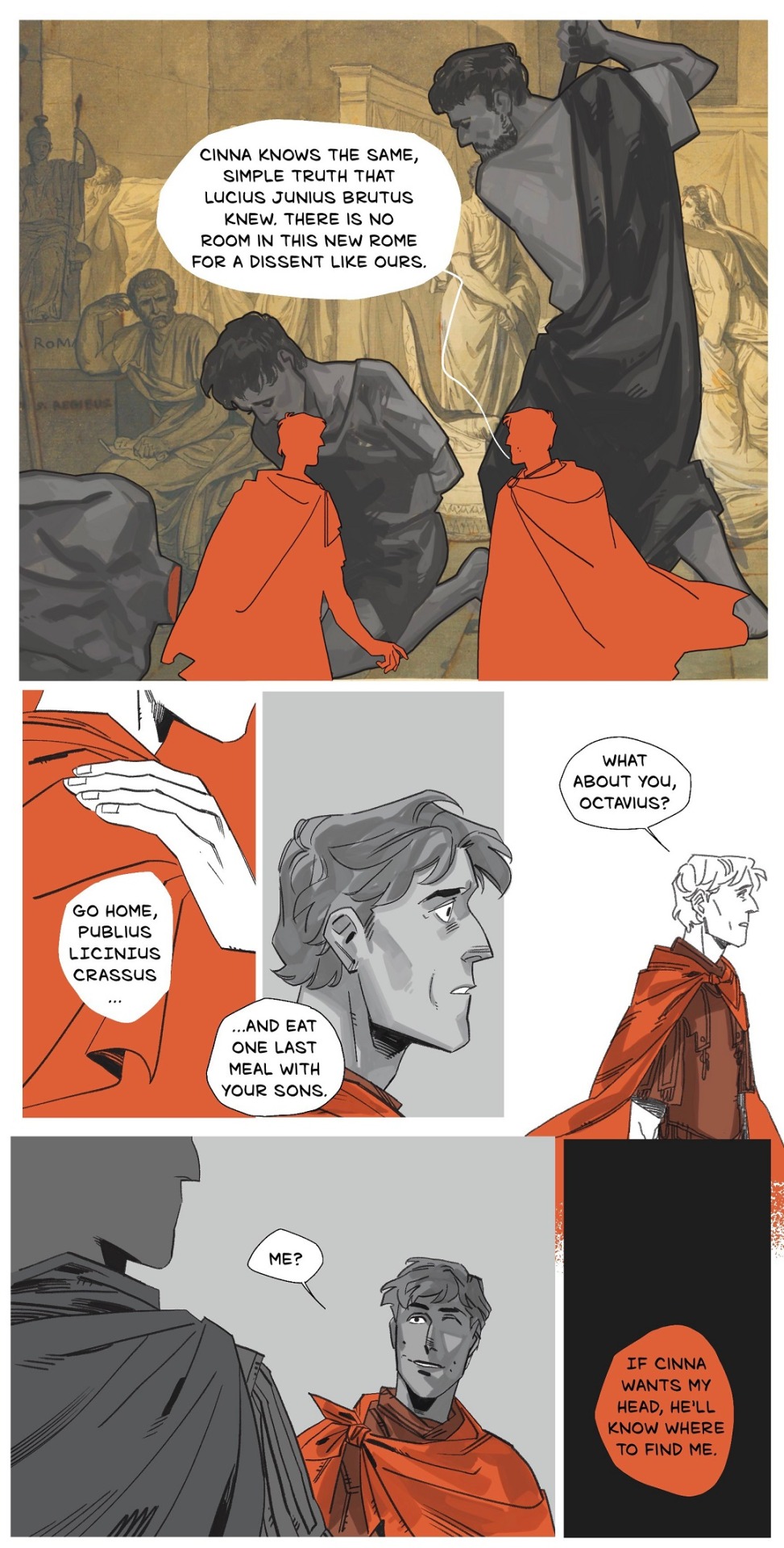
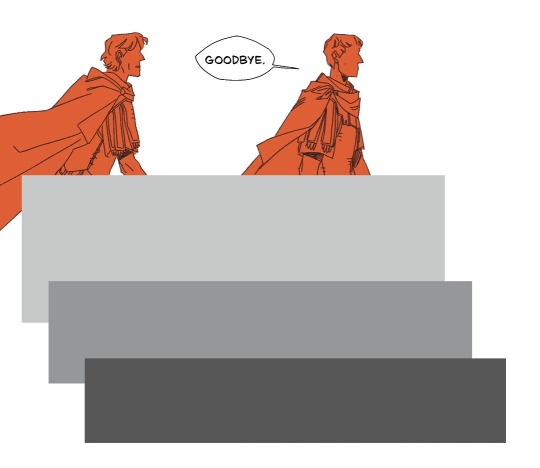
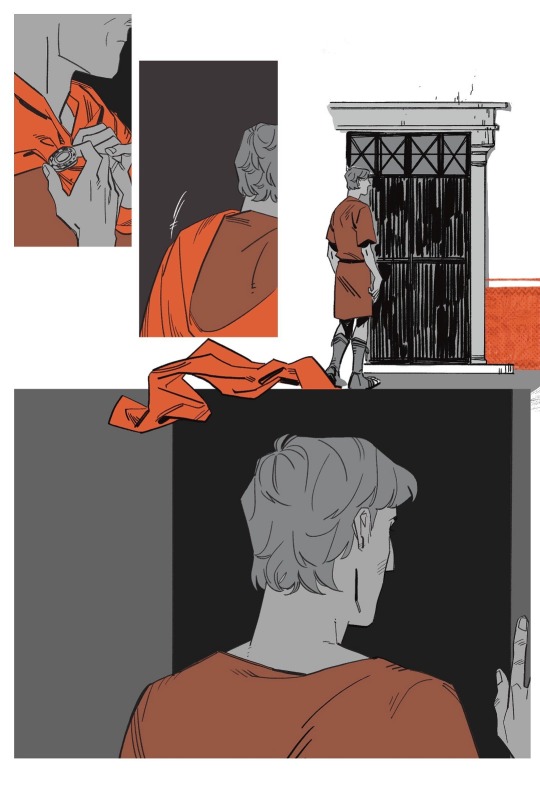
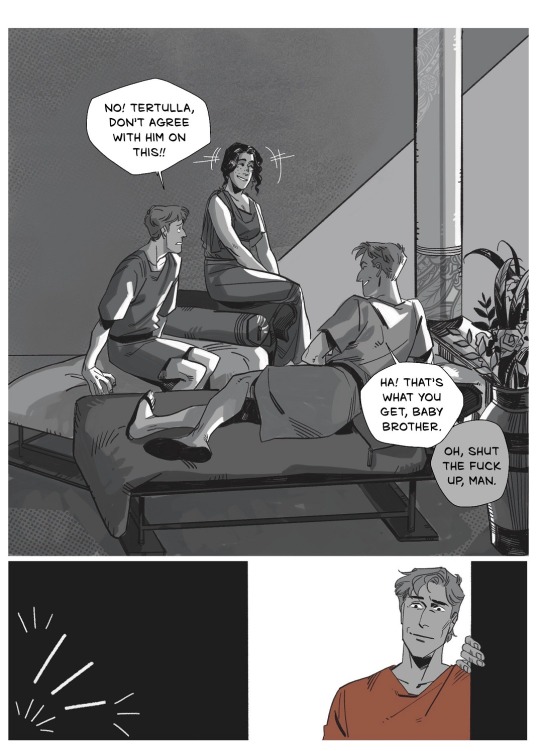
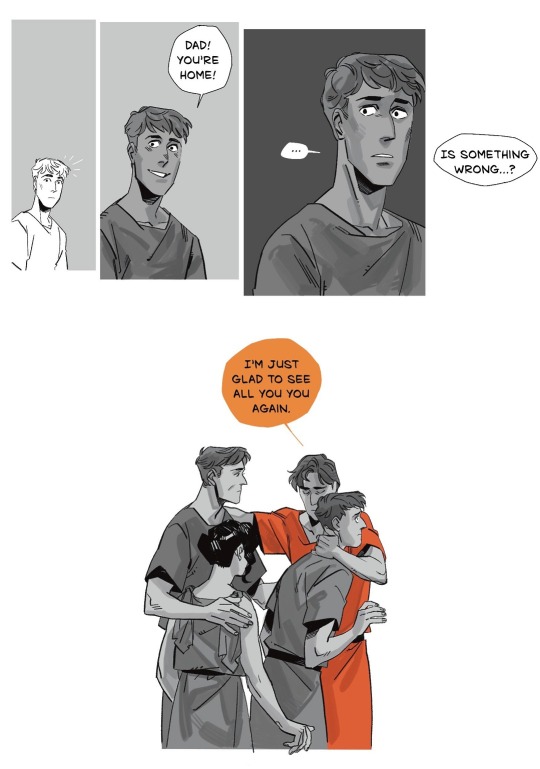
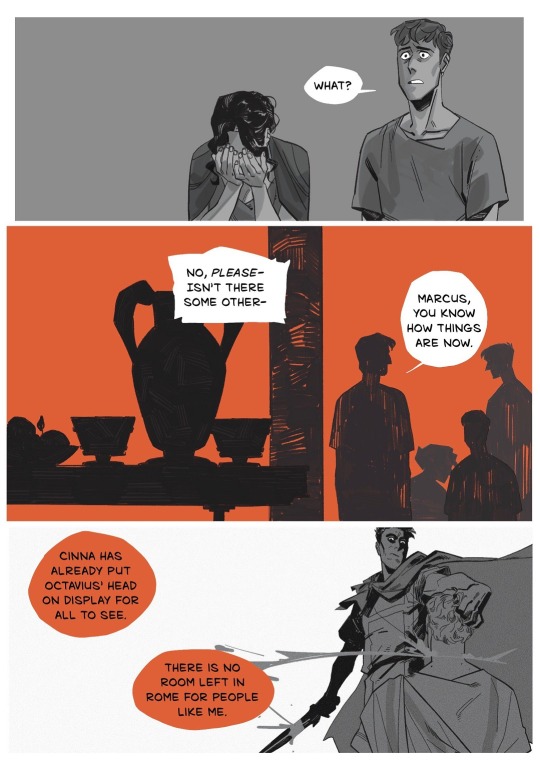
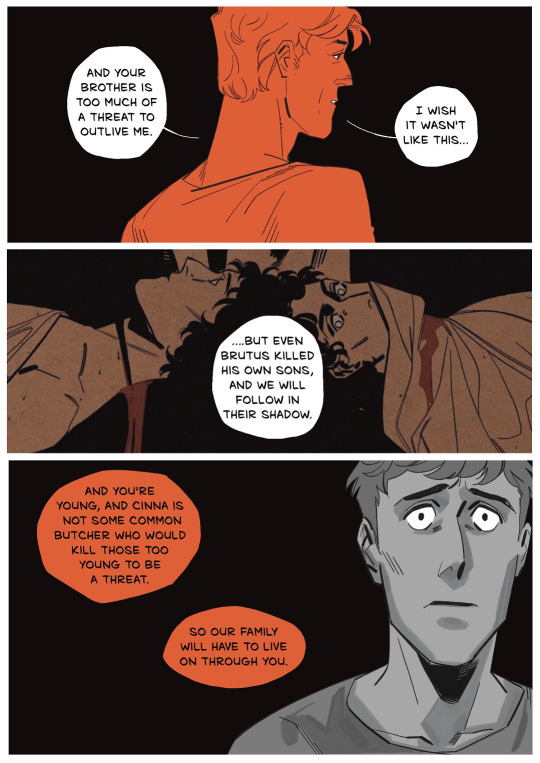
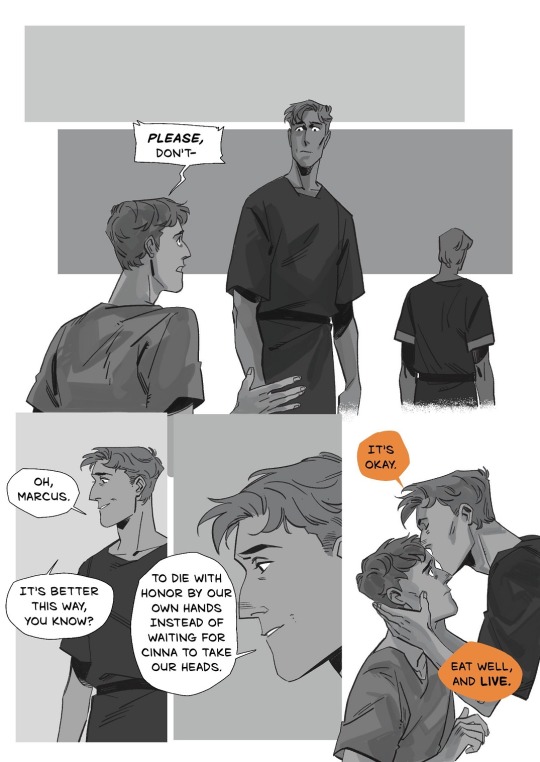
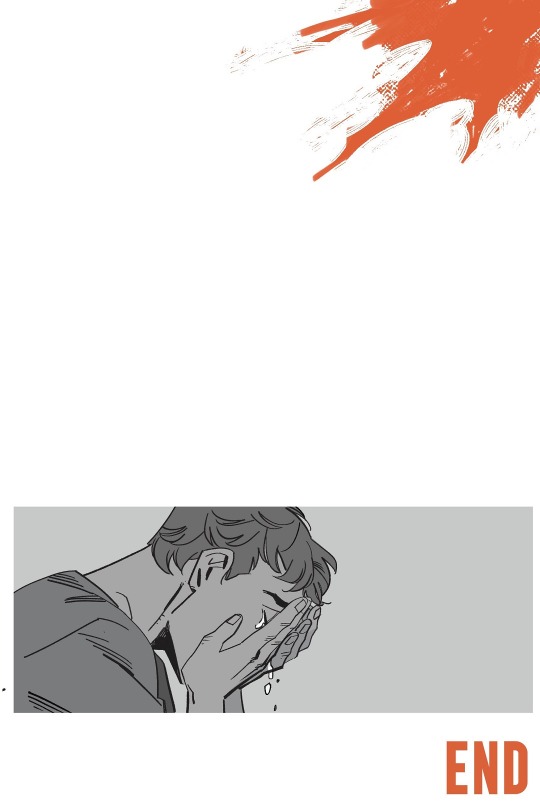
TRIKARANOS CHAPTER I: S·T·T·L
TRIKARANOS is a dramatized narrative based on ancient events following Crassus (and Pompey and Caesar) through the years 87-48 BCE. Intended for an adult audience.
⭐ Trikaranos will always be free to read. In the near future, you’ll have the option to support this comic & my ability to spend time making it (I Am Extremely Fucking Broke And Have Bills To Pay etc etc) through Patreon! currently, I have a tip jar!
⭐ There is no set update schedule (chapters vary in length and will be posted as I finish working on them)
⭐ alternative places to read it (coming soon!)
CREDITS all additional art used are in the public domain, and the specific images used are open access, etc
🍊the first collage panel is combination of: Plate 113: Greeks Battling the Trojans (from Ovid's Metamorphoses), Antonio Tempesta / The Trojans pulling the wooden horse into the city, Giulio Bonasone (after Francesco Primaticcio) / Terracotta hydria displaying Achilles waiting to ambush Triolos and Polyxena
🍊the second collage panel is: The Lictors bringing Brutus the bodies of his Sons, Jacques Louis David / the paint over of Brutus executing is own sons is my own work based on the composition of this relief of Brutus and condemning his sons to death.
🍊I also used my own art: a panel from the Prologue, and my own illustration of Brutus with the bodies of his sons
📖 PREVIOUS CHAPTER | START HERE | ToC (under construction!)
UNDER THE CUT creator’s commentary, ancient citations, whatever else seems relevant. ideally, this is optional! you shouldn’t need the citations for it to make sense as it unfolds since it’s a comic and a story first and foremost, but it’s here if you’re curious about something or want to see where the inspiration is coming from!
I'm so fucking normal about Crassus and his family (<<< this is a lie)
Marcus Crassus was the son of a man who had been censor and had enjoyed a triumph; but he was reared in a small house with two brothers. His brothers were married while their parents were still alive, and all shared the same table, which seems to have been the chief reason why Crassus was temperate and moderate in his manner of life. When one of his brothers died, Crassus took the widow to wife, and had his children by her, and in these relations also he lived as well-ordered a life as any Roman.
Plutarch, Crassus
like, it actively fucks me up that this is something that's survived about him for over 2,000 years. they all ate together at the same table. Jesus Christ.
so! Crassus' dad! Publius Licinius Crassus (consul 97) fought on the side of Cn. Octavius (consul 87) in the Bellum Octavianum, and it didn't go great for him.
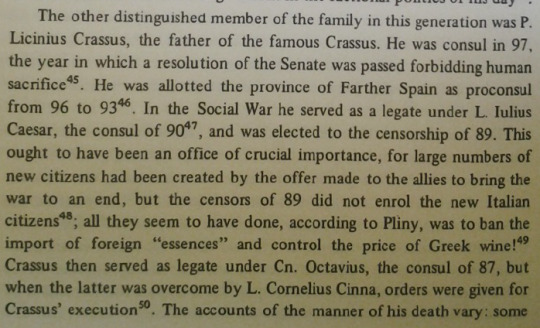
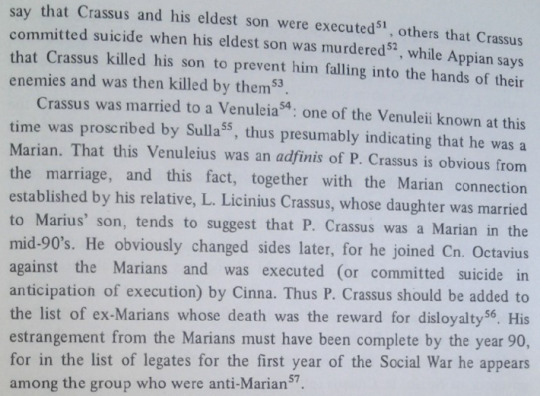
Crassus: A Political Biography, B.A. Marshall
also. currently, if you look Publius Licinius Crassus up on wikipedia for an overview, his page lists his son (and also my main character for this comic) with the cognomen Dives, which is in-fucking-correct.

Marcus Crassus and the Late Roman Republic, Allen Mason Ward
and to circle back to houses and meals shared with family, some citations that made me feel some kind of way when I read them


Marcus Crassus and the Late Roman Republic, Allen Mason Ward
finally, there is discourse or whatever on the placement of the sons of Publius Licinius Crassus. Crassus is the baby brother here simply because I'm writing this story and I get to pick the themes, but also because no one has provided a solid enough argument for him being the second eldest son that I'm willing to buy into with enthusiasm, and I'm more inclined towards G. Sampson's conclusion on the matter.


Defeat of Rome: Crassus, Carrhae, and the Invasion of the East, Gareth C. Sampson
and while I'm just kind of talking about stuff that I read that I enjoyed, this article by Martin Stone lives in my head rent free

A Year of One's Own: Dating the Praetorship of Marcus Crassus, Martin Stone
#trikaranos the komik#hehghghh HELLO i'm back. oof. hgh#if i think too much about them as a family i take critical damage to my hit points
626 notes
·
View notes
Text
my extremely petty and self-indulgent headcanon is that Dabi had started regularly visiting Rei after he joined the League of Villains.
the basis? he lived with a guy who had the best teleportation quirk in the mha universe. and one thing about that guy? he was the dad of the group. sorry not sorry but Mr Daddy Issues was doomed to imprint on him.
more basis? the first thing Touya thought about when he woke up after almost burning to death and spending 3 years in a coma with no idea how he survived or even where he is? 'i need to apologize to mom'. he would be taking that chance if he had it at all.
what about Rei? there's really no reason for her to be faithful to the system the way she for some reason is in the latter part of the manga. some facts from her biography include: being sold by her own family to the man who would offer to buy her, with no possibility to object, becoming an incubator for said man even when she plainly stated she didn't want to have more kids, being abused so badly she was slowly driven into psychosis while being the primary caretaker of 4 children, being aware of her slipping mental state, begging her mother to help her on the phone and being denied that help. then she spent 10 years in a mental hospital and the only people who visited her were her children. this woman's entire life was ruined by the system and by a hero number two personally. the only reason she had started recovering at all and didn't lose her sanity completely was her children, who became her new reason to live and work harder on her recovery. until Shouto came to visit her, 10 years after they were separated by Enji, only Fuyumi and Natsuo were visiting her. and neither of these two was in a good place mentally, both having to raise themselves after their nanny had left and Enji didn't hire anyone else to take care of his teenage children. that, coupled with her guilt over hurting Shouto and mourning Touya's death when he died so young and neither she nor Enji did anything to save her, is an very heavy burden to bear.
with that basis, I truly think Rei not caring about her son being a villain would have been fully in character, had he sought her out before the war. she would have jumped on the first chance to have her eldest son back in her life, and she would have supported him just the same as she supported Shouto. she cares about her children's well-being first and foremost and her life experience allows her to be aware that public approval does not necessarily mean a good thing. she knows her children and she encourages them while being respectful of their boundaries. she never told anything to Natsuo about him moving out and leaving Fuyumi alone with Enji in the family house. she was never showed scornful or disapproving of Touya's training despite the fact Enji literally beat her for it, because she recognized how important that was to Touya. when she started a conversation with him on that topic, she asked 'do you even want to be a hero?'. little Shouto hated the thought of becoming a hero because he hated his father, but Rei still encouraged him, because she saw his admiration of Allmight.
so, if Dabi showed up in her hospital room and announced himself as a villain, I don't think this would make Rei any less motivated to reconnect with her long-lost son. she would want to know everything about his life in the past 10 years, and she wouldn't judge him for any of it. just like with Shouto, she would meet his apology with one of her own, because she felt genuinely guilty and responsible for the way he suffered throughout his childhood, and she would make amends by giving him as much of her attention and support as he would allow her.
also I just adore the image of the three Todoroki siblings coming to visit her unannounced and Dabi hastily hiding under Rei's bed. the funniest family reunion possible.
and Rei listening to Dabi's tales of League's antics just the same way she listens to Shouto talking about his classmates? top tier content
#yes i am back on my bullshit of fixing the todofam arc#some controversial takes here#'dabi is an unfeeling monster who eats children's ashes for breaksfast' crowd kindly don't interact#or join my blocking spree#bnha#boku no hero academia#silly bnha headcanons#todoroki rei#todoroki touya#dabi#todoroki fuyumi#todoroki natsuo#todoroki shouto#and keeping up with the todorokis
36 notes
·
View notes
Photo

Oda Nobunaga
Oda Nobunaga was the foremost military leader of Japan from 1568 to 1582. Nobunaga, along with his two immediate successors, Toyotomi Hideyoshi (1537-1598) and Tokugawa Ieyasu (1543-1616), is credited with unifying medieval Japan in the second half of the 16th century. An innovative general who also used diplomacy as well as superior military tactics and weapons to see off his rivals, the warlord was infamous for his ruthless drive to conquer all before him.
Rise to Power
Born into a family of local administrators in 1534, Nobunaga's father, Oda Nobuhide (1510-1551) was a minor feudal lord or daimyo in Owari Province, central Japan. Nobunaga would first come to prominence when, on his father's death, he became the lord of Nagoya castle. Using the castle as his base, Nobunaga extended his domination over rival daimyo with notable successes coming in 1555 when he razed the town of Kiyosu and in 1559 when he captured and obliterated the fortress of Iwakura. The warlord's reputation for ruthlessness was firmly established in 1557 when he ordered the murder of his own brother. In 1560 at the Battle of Okehazama, the warlord of Mikawa, Imagawa Yoshimoto (1519-1560), was defeated and killed when Nobunaga's outnumbered army sprang a surprise encirclement of the enemy. Nobunaga was well on his way to becoming Japan's most-feared military leader.
Nobunaga is the subject of two biographies in Japanese history, the first was Shincho koki by Ota Gyuichi, which was published in 1598, while the second, Shincho Ki, was published in 1622 and was compiled by Oze Hoan as an extension of the earlier work. Both works glorify their subject and, as with similar posthumous biographies of the medieval period, exaggerate the deeds of the famous daimyo and insert episodes of legend which likely never happened at all. The Jesuit missionary and historian Luis Frois (1532-1597), however, gave a much more revealing description of Nobunaga in the following extract from a letter written in 1569:
A tall man, thin, scantily bearded, with a very clear voice, much given to the practice of arms, hardy, fond of the exercise of justice, and of mercy, proud, a lover of honour to the uttermost, very secretive in what he determines, extremely shrewd in the stratagems of war, little if at all subject to the reproof, and counsel of his subordinates, feared, and revered by all to an extreme degree. Does not drink wine. He is a severe master: treats all the Kings and Princes of Japan with scorn, and speaks to them over his shoulder as though to inferiors, and is completely obeyed by all as their absolute lord.
(Keen, 1159)
Continue reading...
43 notes
·
View notes
Text
୨୧ biography of meee ୨୧
hiii i’m cassidy nd this is my blog!!
first and foremost i’m a 15 year old little girl ⋆ ˚。⋆୨୧˚ (sex blogs, men 18+ please don’t interact with me)
⋆ ˚。⋆୨ so sum things i love are poetry, literature, reading writing, lana del rey, hello kitty, horror movies, nature, the sturniolo triplets (IF YOU SEXUALIZE THEM (WRITE SMUT ETC.) DO NOT INTERACT. DONT LIKE, FOLLOW, REBLOG ETC.), pirates, marine biology, astronomy, psychology, philosophy, cherries, anddd so many more things that you probably can and can’t guess ୧⋆ ˚。⋆
♡ my favorite colors are light pink, dark red, black and light grey
♡ my favorite singers/bands are lana del rey, mitski, bjork, queen, deftones, frank ocean, amy whinehouse, tchaikovsky, mozart and melanie martinez !! ౨ৎ
♡ my favorite songs are in my feelings, off to the races and pretty when you cry; by lana del rey, good looking by suki waterhouse, killer queen by the band queen, too drunk too fuck by nouvelle vague, french music rlly and roslyn by bon iver & st. vincent
♡ my favorite movies are birds of prey, twilight, scream Vl, sleeping beauty and black swan
♡ my favorite tv shows are 2 broke girls, american horror story, gilmore girls, spongebob and ben and holly’s little kingdom
♡ my dislikes are clowns, racists, homophobia, anything of the demonic witchcraft supernatural shit, green beans, pain, teenage boys at my school and COCKROACHES
♡ and sum random things i’d like you to know !! i want to be a marine biologist and astronomer. i rlly could never tell you my aesthetic. i’m a christian girly, God is always first !! i LOVE tim burton movies and im very pretty, ty for reading!! i love you xx <3
ND FREE PALESTINE 🙏🏽 🇵🇸
my pinterest and musiii !! ౨ৎ
25 notes
·
View notes
Text

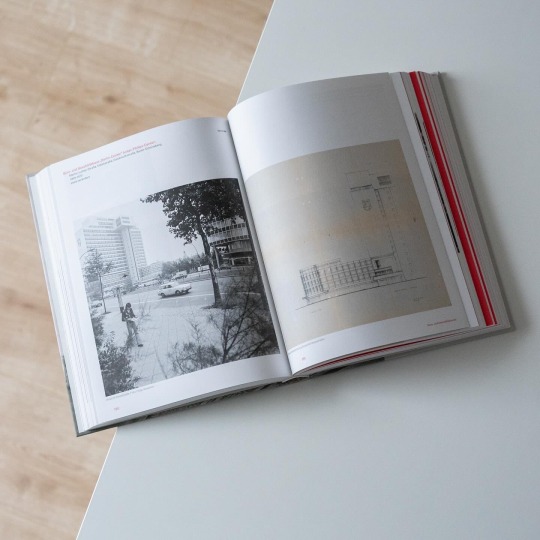
„Berlin kommt wieder“ was a well-known saying in postwar Berlin and referred to the (political) will to restore the metropolis to its former glory. In view of the city's massive destruction this task was ambitious but also accelerated the fantasy of planners and architects, two of which were Paul Schwebes and Hans Schoszberger. The two joined forces in 1956 and decisively shaped the old City West between Kurfürstendamm and Tauentzienstraße through their buildings and related urban plannings.
Schwebes, a former collaborator of Bruno Paul, and Schoszberger, who formerly collaborated with Ernst Neufert, complemented each other on both the business level and architecture-wise: grid-like facades alternate with tiles, elaborate color schemes and subtle architectural details, e.g. in the well-known Haus Hardenberg.
But despite their undoubted importance for postwar Berlin there have never appeared any substantial publications on their work, a major gap that has recently been closed by the present monograph: „Berlin kommt wieder - Die Architekten Paul Schwebes und Hans Schoszberger“, written by Karin Wilhelm, Johann Sauer and Nicole Opel & published by Jovis Verlag. The book not only contains a profusely illustrated work catalogue but first and foremost focuses on the architects and their contribution to the postwar architectural landscape in Berlin: in her detailed essay Karin Wilhelm outlines the biographies of Schwebes and Schoszberger, carves out their architectural personalities and follows their close involvement with the politics and economy of Berlin. Sauer and Opel in turn e.g. discuss Schwebes’ activities for the Aschinger AG, a food service establishment and hotel company, that date back to the 1930s or Schoszberger’s involvement with the theaters on the Ku’ Damm.
With the present book the authors close a major gap in the history of Berlin and German architecture and with the comprehensive work catalogue for the first time offer a complete overview of Schwebes’ and Schoszberger’s work. It thus establishes a basis for further research into particular aspects and buildings and is warmly recommended to anyone interested in German postwar architecture.
#paul schwebes#hans schoszberger#monograph#architecture#germany#nachkriegsarchitektur#nachkriegsmoderne#architecture book#book#jovis verlag#architectural history
24 notes
·
View notes
Note
https://www.tumblr.com/transonlyspace/738342430024302592/you-guys-are-really-forgeting-who-gave-you-rights?source=share
you guys are really forgeting who gave you rights huh
I don’t follow links sent to me by anonymous askers but context suggests you’re attempting to hit me with the historically inaccurate and wildly homophobic “fact” that LGB people sat around waiting for a handful of brave trans women to give us civil rights.
Real life isn’t a young adult novel. In real life countless gay men and lesbians worked for half a century to achieve what they have and it’s taken you shit heads less than a decade to undo huge amounts of that work.
Some facts for you gendies:
- Stonewall did not create the gay rights movement nor did it directly secure any civil rights
- even if it did, not everywhere is the USA
- Marsha P Johnson said in his own biography that he saw himself as a gay man as well as a trans woman and like many people of his era, did not believe himself to be literally female
- Even if Marsha P Johnson was insistent that he was a woman, he didn’t throw the first brick.
- trans people and bisexuals were both involved in early movements but not at anywhere near the same levels.
- the modern concept of bisexuality didn’t exist back then. And the modern concept of gender and trans identity is even newer. Most trans people saw themselves as homosexuals first and foremost. There were virtually no opposite sex attracted transsexuals.
#radical feminism#radical feminist safe#radical feminist community#radical feminists do interact#radical feminists do touch#radblr#trans history#transgender history
34 notes
·
View notes
Text

2.5/5
There is no doubt that the life of Alexander Hamilton is interesting. However, the biography of Chernow seems to emphasise mainly that; making and interesting story. Chernow is first and foremost a journalist and that is quite evident in the biography since his main focus appears to be sensationalism and not factual information.
Through the book there is a theme of determining who is the “hero” and who is the “villain” of the narrative, and in most cases Aaron Burr is cast in the role of the “villain”. I believe it’s necessary, in order to get a full picture of Hamilton’s life, policies and opinions, for a person to not limit themselves to just this biography. Instead they should seek out biographies of Hamilton’s adversaries, mainly Burr, but also Adams, Jefferson or Madison. Reading only one of these books doesn’t offer a full picture of the way these people behaved.
Chernow does show a lot of Hamilton’s faults but there is always a continuation with a justification for the subject’s actions; something that is undoubtedly true for every biographer, no one can be fully impartial.
Another grievance that I have with this book is that the sources are often times impossible to trace. It’s filled with anecdotes with no reference, letters are cut and sewn together with no clear indication of when that happens and when they are sourced, they are impossible to find in the material referenced.
Another theme that was noticeable throughout the book was a pendulum swing between a “Madonna” character, submissive, traditional wife Betsey that loves her Hamilton despite all his faults, and a “whore” -a femme fatale- who gives Hamilton a break from his mundane, homely life. Whether that be Maria Reynolds, the woman that seduced him and despite Hamilton’s best efforts, he, unfortunately -more so for his public image than his wife and children- couldn’t free himself from her claws, or Hamilton’s sister in law, Angelica Church, who enchanted him from the very start with her smart, flirtatious, witty banter, and had she been single would now be know as Angelica Hamilton, née Schuyler .
Overall, I believe it’s a good beginning if you want to get started with that era. It is, however, necessary to read other books, even about people you dislike, in order to get a more well rounded perspective of that time.
#crazy how anna karina is sooo interested in the amrev#yap yap yap#sorry about that#:3#spent a month reading his for a 2/5 😭😭😭#alexander hamilton#ron chernow#hopefully my final post about this guy#amrev#founding fathers#goodreads#book review
19 notes
·
View notes
Text
Grailfinders #331: Taigong Wang

today on Grailfinders we’re making Jiang Ziya, a.k.a. Jiang Shang, a.k.a. Lu Shang, a.k.a. Master Shangfu, a.k.a. Taikoubou, a.k.a. Taigong Wang. almost as numerous as his aliases are his accomplishments, such as ousting the daji from China, defeating the shang dynasty, and even creating quite a few gods through the power of being a really cool dude.
thankfully his build is slightly less complicated than his biography- he’s a Beast Master Ranger for a shape-shifting mount, and a Drunken Master Monk to blend strategy with a god-slashing whip- and also that cool “step on their head” attack.
check out his build breakdown below the cut, or his character sheet over here!
next up: it’s like someone stuck Artoria and Siegfried in a conceptual blender
Ancestry & Background
Taigong Wang is a Human, giving him +1 Dexterity and Wisdom, as well as proficiency in Acrobatics. you also get a feat of your choice here, but we’ll talk about that after we go over his background.
we’ve done plenty of tacticians before, but most of those guys weren’t running around with secrets from ancient mage societies, so we’re calling Shangfu a Mage of High Sorcery here, in part because of his investiture and secret magics, and in part because we need this background for a later feat. this gives you proficiency in Arcana and History, as well as the Initiate of High Sorcery feat- we’re grabbing the Lunitari version of the feat for Feather Fall and Longstrider- yes you’re a monk and that makes these spells mostly useless, but you don’t start as one, and multiclassing makes your speed and falling a little weaker than a full monk. you also get the True Strike cantrip to be all tactical and gain advantage on your next melee attack, but after six seconds of thinking you’ll realize the real tactical move was just to attack twice.
that being said it’s called the investiture of the gods for a reason, so we need to get a little godly. coming back around to your human feat, you’re also a Scion of the Outer Planes, specifically the good ones. this gives you resistance to radiant damage (making you an even better pick to fight gods), and you can cast Sacred Flame at will. I don’t think fire is part of your kit, but you’re practically a caster anyway, it’s fine.
Ability Scores
your Wisdom needs to be number 1, that’s how you know clever tactics like “don’t fuck up your government” and “don’t hire people who are bad at their job for your army”. I know it’s easy to clown on that now, but somebody had to figure it out the first time, right? second is Intelligence- if we didn’t need monk stuff and a horse you’d probably be a wizard, but you’re still smart regardless. your Dexterity is also pretty high because you don’t wear armor and use a whip. both of those make me question the “genius tactician” thing a bit, but they clearly work for you. this does mean your Constitution isn’t particularly high, but you don’t need HP if you don’t get hit. your Strength is neutral since we just don’t need it for the build, and we’re dumping Charisma. you’re so untrustworthy Fou gets merlin vibes from you. yikes.
Class Levels
1. Ranger 1: sadly, we need ranger levels first and foremost both to get your whip proficiency and so your background makes sense, but on the plus side at least you can have celestials as your Favored Enemy, giving you advantage to track them down and recall information about them. you put a lot of gods in heaven to begin with, it would be awkward if you forgot their names after all that.
you’re also a Deft Explorer, but before I go into that- you’re proficient with Strength and Dexterity saves, as well as Athletics, Perception, and Insight. the reason I bring this up is because the first part of deft explorer makes you Canny in one skill, such as Insight, doubling your proficiency bonus with it.
2. Ranger 2: second level rangers get a fighting style, and obviously we’re grabbing Duelist for a +2 bonus to one-handed attacks. whips are bad, but now it’s better. slightly.
also, you learn Spells that you cast using your wisdom, like Ensnaring Strike for a sick whip trick, forcing the next person you whip to make a strength save or become restrained for up to a minute. while trapped, they also take damage from the whip digging into them! if you’re worried about wasting damage on a long-term spell like that, you can instead use Hunter’s Mark, adding damage to your whip for up to an hour, plus you have advantage to track the target down if they flee. you also get a chance to move the spell over to another target after the current one dies, so it’s pretty economical!
3. Monk 1: okay, we’ve got the basics of whipping down, let’s get the rest of your fighting style. as a monk you gain Unarmored Defense, adding your wisdom score to your AC as long as you’re not wearing armor or a shield. I don’t care how sick the drip is, it’s not armor.
you also learn some Martial Arts, so now your whole body is a deadly weapon. you can use your dexterity instead of strength to attack with monk weapons or your fists, and if you use your action to attack with the aforementioned weapons you can make an unarmed strike as a bonus action. on top of that, your monk weapons and fists also do a minimum of a d4 of damage, and that amount will only go up as you level up. your whip isn’t a monk weapon yet, but give it a second- besides, it doesn’t gain much from martial arts at the moment anyway.
4. Monk 2: now that the second is up, second level monks can make their whip a Dedicated Weapon, so you can call it a monk weapon all you want after an hour of prep work. you also get Unarmored Movement, so you’re faster than everyone, and your Ki makes you even faster by letting you dash as a bonus action by spending some. you can also spend it to attack twice, dodge, or disengage as a bonus action, and your ki pool recharges every short rest.
5. Monk 3: at third level, this game finally becomes a party as you become a Drunken Master- you don’t actually have to be drunk for this, but you do have to act like it. that’s why you have proficiency with Performance and brewer’s supplies so you can pick for yourself.
that being said, beer doesn’t win every fight, so you get actual features too- your Drunken Technique means that every time you use a flurry of blows (the two attacks as a bonus action from last level) you also disengage, and your movement speed increases by 10’ to boot. maneuvering is always a big part of tactics, so anything that makes it easier for you to get where you want to go is just good strategy.
you can also Deflect Missiles now, reducing damage from incoming archers and even throwing the arrow back if you nullify the damage and spend ki.
6. Monk 4: fourth level monks get their first Ability Score Increase, so increase that Dexterity for better dodging and more accurate attacks. you can also Slow Fall now for reduced fall damage, so fighting Nikitich isn’t quite as bad an idea as before.
7. Monk 5: fifth level is huge for monks, if you’re the kind of person to like hitting things. your martial arts improve to deal d6s, you get an Extra Attack each action, and you can turn any attack into a Stunning Strike- force a constitution save on someone, or they get stunned for a round, giving advantage to everyone trying to hit them and keeping them from retaliating. “don’t get hit” is also pretty sage advice. of course, all this still requires you to hit someone- thankfully you can use Focused Aim by spending ki to add to your attack rolls. it’s a huge ki sink, but sometimes defeating an enemy now is more important than saving materials for later. I know, strategy, in the strategist build, wild right?
8. Monk 6: sixth level monks get Ki-Empowered Strikes, so now your unarmed attacks are magical and can overcome resistances to bludgeoning damage. it’s a shame this doesn’t apply to your whip as well, but I feel like any kind of god-chastising whip is more of a quest item than something you should just have. don’t worry though, by the end of this build your whip will be strong enough to chastise a lot of things, even if it isn’t a legendary weapon.
that being said, your Tipsy Sway is a pretty cool consolation prize- you can leap to your feet from prone for just 5’ of movement, and you can spend a ki point to redirect attacks that miss you into hitting another creature. I’m pretty sure that’s more Sun Tzu than Taigong, but the smartest people know when someone else had a good idea.
9. Monk 7: seventh level monks get Evasion, improving the damage reduction from dexterity saves. now you’re practically immune to fireballs, so fighting Nikitich is almost starting to look like a good idea!
you also have a Stillness of the Mind that lets you shut down any effects that are charming or frightening you. you don’t have a choleric temper, so enemies will not be irritating you much. wait, no, that’s still Sun Tzu, sorry.
10. Monk 8: I think we’re about at the point where you hit your third ascension, but before then we’re getting another ASI and making you an Adept of the Red Robes. first, this gives you access to a second level spell that you can cast for free once a day. for this build we’re grabbing Dragon’s Breath for your mount later, but if you want to help Guda and company when you first meet up you could grab Levitate instead. right now you can only cast it via this feat, but you can use second level spell slots to cast it like a normal spell once we get those.
thankfully, that’s not the only thing this feat does. you can also restore magical balance whenever you make an attack or check, turning your roll into a roll of ten, up to proficiency times per day. your strategy might not always work, but at least it will never fail.
11. Ranger 3: I think we’re doing good on the whip, but we’re not quite godly enough yet. heading back to ranger at least lets you hunt them down easier with Primeval Awareness- you can spend a spell slot to detect celestials within a mile of you, as well as various other kinds of extraplanar monsters. that means it should work pretty well against Koyanskaya too- or at least it would if she hadn’t surrounded herself with all other sorts of monsters.
you’re also a Beast Master now, which means you can summon a shape-shifting Primal Companion to pal around with. none of them can technically be ridden, but tbf you don’t look super comfortable on that tapir anyway. you and your companion both move on your turn, but the only way to make your animal do anything but dodge requires you to spend your bonus action telling it what to do. or for you to get knocked out. nobody said good strategies are easy to pull off.
you can spend spell slots to resummon a dead companion, or wait until you finish a long rest to summon one for free.
on top of that, you get another spell- since we’re not getting true flight, I hope grabbing Zephyr Strike will make up for that somewhat. for a minute you get free disengaging, and you can end the spell early to get advantage on a weapon attack and deal extra damage if it hits. on top of that, your walking speed increases by 30’ that round, letting you blast yourself a truly silly amount of distance.
12. Ranger 4: fourth level rangers get another ASI, and it’s finally time for you to become a Righteous Heritor. that increases your Dexterity score by one, and you can protect your allies by spending your reaction to reduce any incoming damage for them, up to proficiency times a day.
I’m not actually expecting anyone playing this build to have to come up with clever strategies all the time; having a couple “whoops we fucked up” buttons that undo damage is just as good.
13. Ranger 5: fifth level would be a dead level for you, but thankfully rangers get second level spells! it’s still not flying, but Gust of Wind can knock people around with air, so it’s the closest we’re getting. (plus if you gust someone off a cliff they’re technically flying… downward… for a short period of time…)
14. Ranger 6: sixth level rangers get another favored enemy, and if Daji isn’t a celestial she’s probably an Aberration. you don’t get any new additions to the feature, but it works on twice as many monsters. what is new this time around is your new Deft Explorer feature, Roving. you get a small boost in movement speed, and you have a climbing and swimming speed now. have you seen Chinese mountains? honestly it would probably be easier to just run straight up them.
15. Monk 9: ninth level monks can run straight up them thanks to your Unarmored Movement Improvement- as long as your turn ends on solid, flat ground, you can run over water or up walls. you might think this makes the last level of ranger useless, but having a climbing speed should make it easier to latch onto the cliff face in-between turns so you don’t just fall all the way back down. clever thinking like that’s why you’re a strategist.
16. Monk 10: tenth level monks have a Purity of Body that makes you immune to disease or poison. as far as I’m aware, Taigong Wang never got sick or poisoned in the Investiture of the Gods, and that book’s 100 chapters long. this is mostly because I never read the thing, but still.
17. Monk 11: eleventh level monks get d8s for their martial arts, but more importantly you have a Drunkard’s Luck- or possibly a drunkard’s strategy. whenever you’d have to make an attack, save, or check at disadvantage, you can spend two ki points to cancel it. this also works on rolls where your advantage and disadvantage cancel each other out, which is extra fun. combine this with your magical balance, and now your plans should never fail.
18. Monk 12: we had to spend so many ASIs on feats that one of our stats is still odd, so this last one will be no different. the Slasher feat will even out your Dexterity, but it also reduces a targets speed when they take slashing damage from your whip, and critical hits force disadvantage on that creatures attack rolls for a turn. crits are luck-based, but luck is just strategy you’re too humble to claim ownership of.
19. Monk 13: our penultimate level gives you a Tongue of the Sun and Moon, letting you speak and understand all languages. if you get a couple hundred gods into heaven, you can skip your duolingo practice, those are the rules.
20. Monk 14: the real reason we stuck with monk for so long, our final level gives you a Diamond Soul, granting you proficiency on all saving throws, and even if you fail one, you can spend a ki point to reroll it. having to maintain concentration on hunter’s mark is the worst part of being a ranger, and now that shackle is lifted. go forth, and slap things with slightly more damage than usual.
Pros & Cons
Pros:
Hunter’s Mark is always a fantastic spell to have on a monk due to how many attacks you get each turn. monks already do decent damage, and when you have your mark up you can put some serious pain on people. being able to almost constantly have the thing active since you’ll never drop concentration is also a nice bonus of the build.
speaking of, you almost never fail at anything. you can give yourself advantage, ignore disadvantage, and even fudge your roll a couple times a day. some call it luck, but if it came from a build you chose to use, that’s strategy. and Taigong Wang is a damn good strategist.
whip monks are also great, it’s a shame the last one we built was like, Cursed Arm. you’re already ridiculously fast, and by using a reach weapon you can attack enemies and bolt without needing to disengage, then run out of their reach so they can’t even attempt to retaliate. it’s not quite flight, but it’s up there in terms of good strategy.
Cons:
you can do a lot, but most of that a lot lands in your bonus action, forcing you to choose between most monk abilities. ranger spells, or actually using your beast. variety tends to be a better build goal than just doing one thing well, but it will mean you have to actually think about what you want to do and when.
we also grab a lot of feats, so your overall stat total is lower than most people’s. it’s not a huge issue, but it does mean you’re squishier than I’d like and your spells aren’t powerful.
Beast Master. just. beast master. literally any other ranger subclass would have been a more useful pick, but we needed a shapeshifting buddy. you can’t even ride on him- at least, not comfortably. your tapir will almost certainly die in one round if you take it into a fight, and even trying to use it in combat blocks you from using a ton of your monk abilities.
22 notes
·
View notes
Text
The Funny bone🦴 Hot Dog🔥 Connection
remember that "funny bone was a fire dog before he became undead" theory i mentioned in the Funny bone headcanons post? this is that theory. click read more if you feel like reading my intense brainrot
ok, if you clicked read more, you understand what you're getting into, so strap in folks this is gonna be a long one.
first and foremost, their physical similarities, aka, what spawned this in the first place.

put the two side by side and you can probably already see what i'm talking about.
first one i'm going to talk about is head shape, especially the shape of the face

as i've outlined in the above image, both funny bone and hot dog have similarly pronounced brow lines, and both have a pug-like smushed in snout style, as well as very similarly proportioned eyes compared to the rest of the face. they even have similar arrangements of teeth, the only difference is funny bone having an extra two on the bottom jaw.

next up, the legs/torso.

as i have once again circled, the way their legs are shaped/situated are eerily similar. same paw shape, same number of toes, same claw style, same overall leg shape, the only reason hot dog looks any different is only one of the two has any meat on their bones, pun definitely intended. another of many similarities that cannot be ignored.

i used a different hot dog image for this one since the poses are more similar, to more easily outline their once again almost identical body shapes. of course funny bone being a skeleton does effect things a bit, but it's still clear that their bodies are extremely similar.
now onto the things that could poke holes in this theory, and my answers to them.
first up, funny bone's horns.
while yes, funny bone has rather large horns, and hot dog does not, hot dog is explicitly stated to be a fire dog pup in his biography, and many more times referred to as a puppy. since, at least to my knowledge, hot dog is the only fire dog we see, who's to say two of those spikes on his head don't grow into horns on older individuals?

there's even a set of spikes on his head in almost the same spot as funny bone's horns, even more evidence to my theory.
another major point, their tails.
funny bone's is a fair bit longer, and has a rather large crystal at the tip, while hot dog's is very much not.

as we can see, hot dog's tail is short and fluffy, a bit like a tail one would find on a young husky or pomeranian. who's to say under that fluff, there isn't a little crystal similar to that on funny bone's? and like that of a husky, the tail would likely grow longer and fluffier later in life, accommodating a larger crystal.
next up, psychological similarities. yes i am going this deep. it is 1:44 AM as of typing this and i have 0 remorse.
while Funny bone gets very little in the way of characterization, we can draw quite a bit from what little there is.
first up, they both have a explicitly mentioned tendency to bury things.
"Hot Dog was brought back to Eon's Citadel where he became a Skylander - and then he proceeded to bury Eon's staff."
"and true to his nature, he likes to bury things, especially imps."
" Funny Bone was in the middle of burying his neighbors’ birthday cake on a breezeless day when the invaders arrived."
the three above quotes come from official statements in Skylanders Universe: The Complete Collection and Skylanders Universe: Book of Elements - Fire and Water
their in-game lines also show several parallels.
Funny bone:
"Beware of dog!"
Hot dog:
"Fear of dog!"
Funny bone:
"All bark and all bite!"
Hot dog:
"My burn is worse than my bite!"
Funny bone:
"Fantastic hat! Ha ha, can i get a collar to match?"
Hot dog:
"Ooh hey, this matches my collar!"
Funny bone:
"Top dog!"
Hot dog:
"Ooh! Top dog!"
in conclusion, funny bone and hot dog share enough parallels, both in biology and behavior, that i have come to believe that before Funny bone became undead, he was a fire dog like hot dog, probably either adult or late adolescent at the time of death.
either that or i am reading way too far into this, which is also a distinct possibility, though in my personal opinion, there are far too many similarities for this to be mere coincidence, especially considering funny bone debuted in Trap team, which was released two years after hot dog's first debut in skylanders giants. ample time to plan these sorts of details into funny bone's design and mannerisms.
#i am so sorry to my mutuals who know nothing about skylanders#this is probably utterly incomprehensible to them.#but to those who do actually understand what i'm talking about:#am i reading way too far into this or do yall see this too?#skylanders#skylanders headcanon#skylanders theory#funny bone#hot dog#skylanders hot dog#skylanders funny bone#game theory#theory#brain dump#late night thoughts
8 notes
·
View notes
Note
I know it is only anybodys guessing really, and I truly do not want to sound like 'the historian' but you would go as far as calling these relationships of napoleon 'homoerotic'? Why? Couldn't it be the case of him having just very warm attitude and be close to his friends like that?
Again nothing against it, but I needed to ask since I as well am the person to get alike towards my close friends and I don't feel it having any attraction undertones.
Thank you for the ask! As usual for me, my response got really long.
I mean correct! It’s literally anyone’s guess. Who knows? Certainly not me! Certainly no one who is alive right now!
I’m just a queer on the internet having fun who sees Napoleon and goes "ah yes, a chaotic bisexual even though the concept of modern sexual identity wasn't a thing in his time etc. etc. [insert all the other usual disclaimers required on this webbedsite]" so that's why.
[How do I know he’s a chaotic bi? Well, it’s very simple, he couldn’t sit properly in a chair, liked to sit on his secretaries’ laps, pull their ears, and tell them Fun Facts he learned that day, and wanted to make the tsar of Russia his mistress. He also dearly loved Josephine and wrote about how he liked going down on her. This is clear proof that he was a chaotic bi king and we should be so lucky to know this about him. ;)]
I'm also a writer who likes to slap a queer lens onto most things because that's how I role and I'm very unapologetic about it. Which most people who follow me know.
I’m also someone who has incredibly deep, intimate friendships with a close selection of people in my life that are not romantic/sexual or whatever in their nature—but they are incredibly intimate. They are friendships where partners of my friends have been jealous and insecure because of how close we are—which is a them problem, not an us problem.
I would go so far as to argue that friends are more likely to slot into that problematic category of “soulmate” than anyone romantic (ymmv). And from the outside, I’m sure people might read my friendships with a few people (have read them, in fact) as romantic/homoerotic and frankly I don’t care. Whatever. I know what my friendships are, why does it matter what other people read them as? More to the point, why does it matter that someone reads a dead person’s friendships as homo-something? How does that impact my friendships which may, or may not, mirror that dead person’s friendships? Who cares? One should love one’s friends however one wishes to. Fuck everything else.
--
In an effort to avoid the Great Queer Napoleon Discourse War of 2013-14 I shall include a disclaimer because hot damn do people get REALLY uppity about this: I’m a writer, first and foremost in all things. I’m not a historian. As noted above, I’m a queer fag on the internet having fun. Take what I say with a grain of salt.
(Honestly, doing anything with Napoleon’s sexuality aside from He Was the Straightest Straight Who Ever Straighted, gets everyone’s hackles raised. I think that says more about those with hackles up than it does the person going: maybe he might have had a bit of a queerness about him, it’s not implausible.)
--
Some general stuff on Napoleon & That Doesn’t Seem Entirely Straight, Even For the 18th and 19th Century:
From Cronin’s biography on Napoleon:
“Napoleon found that his friendships with men often began with physical attraction, and this took a curious form. ‘He told me,’ says Caulcaincourt, ‘…that for him the heart was not the organ of sentiment; that he felt emotions only where most men experience feelings of a different kind; nothing in the heart, everything in the loins and in another place, which I leave nameless.’
The feeling Napoleon described as ‘a sort of painful tingling, a nervous irritability…the squeaking of a saw sometimes gives me the same sensation’.”
In addition, Talleyrand speculated Napoleon and Bourienne were, uh, intimate in all senses of the word. Talleyrand, of course, well—one should treat his hot takes with some caution.
There is also the (in)famous letter Napoleon wrote to Josephine about Alexander where he said that he and Alexander were inordinately pleased with one another and if the tsar were a woman, he’d take Alexander as his mistress (Napoleon, honey, don’t write that to your wife).
I mean, do what you want with that. Take it for what it’s worth /shrug
---
Of the three friendships under discussion: Lannes, Duroc, Junot—I always read Lannes and Napoleon’s friendship as just friendship. Duroc and Junot though. That’s where we start getting into arguments for a homoerotic friendship—or romantic friendship, if one prefers that term.
I’ll do a little ramble for each, because they all deserve it.
Lannes
Napoleon’s friendship with Lannes was intimate, close, and they loved each other dearly—but as said, I always read them as friends. Even if they lived today and were free/able to be whatever they wanted to be to one another, it’d still just be friendship.
People did make Achilles/Patroclus references to them—particularly around Lannes’ death—but that was the mode of how people spoke back then. It’s the 19th century version of comparing everything to LOTR or Harry Potter (read another classical epic people, jeez).
Their friendship was volatile for sure—these are two hot headed, strong minded, opinionated men who were not afraid to snap and snarl at one another—but at the end of the day I do not doubt their love for each other. But it’s what we would term a platonic love.
Brian Martin writes this in Napoleonic Friendship: Military Fraternity, Intimacy, and Sexuality in Nineteenth-century France:
Napoleon’s grief for Marshal Lannes took on the very public character of open lamentation. Rather than grieve behind closed doors and conceal his personal vulnerabilities in order to show public strength, Napoleon’s mourning for his beloved friend became a matter of great public spectacle. Like Achilles mourning his beloved Patroclus, Napoleon wept publicly and openly expressed his affection in a way that was widely reported, discussed, and admired by the officers and soldiers in his armies.
[…]
Napoleon’s public grief at the death of Jean Lannes represented a new model for social relations between soldiers in the early nineteenth-century France. weeping over his friend’s broken body, Napoleon demonstrated how the revolution and empire had made it possible not only for an emperor to grieve openly for a fallen marshal, but for a soldier to love his comrade. This uncharacteristic expression of affection between Napoleon and Lannes was echoes in similar relationships between officers and foot soldiers in Napoleon’s armies. Military memories of the first empire bear witness to a wide range of intimate relationships among generals, colonels, and captains as well as sergeants, corporals, and grunts (grognards), the infantry soldiers who made up the majority of the imperial armies. Napoleon’s love for Lannes might thus be said to represent a broad spectrum of masculine affection and intimacy in the ranks of the Grande Armée, or what could be called Napoleonic friendship.
So yeah, I’ve not much more to say on them. Their friendship was loving, affectionate, intimate, and complex. Lannes could be frustrated with Napoleon (often was, the longer Napoleon remained in power—because Lannes loved Bonaparte not the emperor), but Lannes loved his friend and Napoleon loved Lannes. But my read on them has always been that it was what we would term platonic.
------
Junot
This one is messy. Because Junot and Napoleon are messy people. I also think this one is the strongest case for “something more than friendship”. I personally believe Junot loved Napoleon in a deep, phenomenal, possibly obsessive fashion that absolutely was romantic—maybe sexual/erotic—and Napoleon for a time may have returned at least some of those feelings. Then it all went south.
I’m ripping a lot of this from a previous ask I received about Junot—since it covered a lot of the more romantic aspects of his and Napoleon’s relationship.
Junot and Napoleon were close friends when they were in their 20s. Incredibly close. Laure Junot, whose memoires one should treat cautiously, intimated that there was more than just friendship between them at this point. But if that is the case, we’ll never know for certain.
Brian Martin sums it up well (and saves me from having to dig out my copy of Laure’s memoir):
Soon after his imprisonment, Napoleon was released and exonerated, but with little money and no desire to take on a new military post in Brittany, he returned to Paris where, as Laure Junot explains, he lived with his comrade Junot and depended on his friend’s emotional and financial support … The 1794 letter from Toulon initiates a half-year period in the lives of the twenty-five-year-old Bonaparte and twenty-three-year-old Junot when … these ambitious young men relied on each other during their impecunious days in Paris. Describing how Junot “loved Bonaparte as one loves at the age” (1: 188), Laure Junot implies that the young Jean-Andoche developed an adolescent crush on Napoleon, as the two young men grew in intimacy.
[…]
Laure Junot tactfully observes many years later that it was difficult to assess the nature of these friendships [with Duroc and Junot] without offending their masculinity: “These are the very profound and abstract mysteries of the human heart. It is difficult to explain them without first wounding a man’s dignity” (11: 131).
In relegating Napoleon’s military relationships to the realm of the mysteries, Laure Junot defines Napoleonic friendship — long before “the love that dare not speak its name” was articulated by Lord Alfred Douglas in 1894 and invoked at Oscar Wilde’s trial in 1895 —as an enigmatic and unspeakable love incapable of being articulated without shaming a soldier’s manhood. Amid such ambiguity, it is unclear if such “mysteries” encompass both the emotional and the erotic. What is clearer is that Napoleon and Junot shared a degree of affection during their youth in Paris that was undeniably intimate.
As Napoleon climbed up the greasy pole, the power dynamic changed and expectations of interpersonal relationships became more formal putting a strain on his and Junot’s friendship. Junot, like many who knew Napoleon from the early days, loved Bonaparte, not the emperor. As Laure put it in her memoire: “Now let me explain the sadness and pain which afflicted Junot on learning that Napoleon was no longer his General Bonaparte of Toulon. Perhaps the affair simply followed a natural decline. But Junot … did not see it this way. He wanted reciprocity, which he craved even more as his own affectionate fantasies increased … He loved the man, not the emperor.”
In 1800, Napoleon named Junot Commandant of Paris on the condition that he marry because, it seems, there were too many rumours flying around about the two of them. (As noted above, Talleyrand was already making some “huh. Interesting closeness, there” comments about Napoleon.) Dutifully, Junot married Laure.
Junot always exhibited some signs of mental illness throughout his life and at one point he received a head wound (I forget which battle) that massively exacerbated whatever existing mental health troubles he had. (And note that this was one of many wounds - nor was it his first head wound. It’s just the one people in his own life pointed to as a moment of change.)
Junot had jealous and possessive tendencies, something that drove Napoleon a little batty, and they got worse. While Junot was in Portugal, and later Spain, he wrote Napoleon a series of desperate letters begging him to reappoint Junot as his aid-de-camp. We unfortunately don’t have these letters anymore, Napoleon was notoriously secretive and private when it came to personal correspondence and had a habit of burning lots of it. However, we do have Laure’s account of Napoleon’s reception of Junot’s pleading. Laure writes:
"Look here, Madame, what your husband writes to me!’ said the Emperor, ‘Read this and tell me if he sends you such letters."
I read these letters, and this caused me some pain: my husband sent me affectionate missives, but never in the tone of a lover; here were letters that resembled those between Julie and Saint-Preux, or those of the Portuguese nun.*
Napoleon then goes on and says:
“In admitting that Junot loves me more than anything in the world … [he demonstrates] that he does not love me more than his own ambition”
To which Laure replies:
“He loves you, Sire, more than all the honours that you can give, more than your crown, more than me perhaps, for it was pride that made me say the contrary just now, perhaps even more than his children!”
-
*Note: She’s referencing Guilleragues’s Portuguese Letters (1669) and Rousseau’s Julie or the New Héloïse (1761)
Also, as I said above, treat Laure’s accounts cautiously. As with all memoirs, she is positioning certain scenes with a purpose and some things are downplayed, or exaggerated, accordingly.
-
In 1813, Napoleon dismissed Junot from military duty and sent him off to be governor of Illyria which Junot, rightly or wrongly, saw as a form of exile. During his ambassadorship he famously entered a ballroom wearing nothing but his epaulettes and his medals.
[above para' edited per conversation in the notes]
Brian Martin:
While one could blame Junot’s naked diplomacy on his progressive dementia, his shocking entrance can also be seen as a kind of buff rebuff to Napoleon. After a lifetime fighting for Bonaparte, watching shrapnel rip into young men’s bodies, leading thousands of soldiers to their deaths, and suffering twenty-seven wounds* of his own, Junot offered his own ravaged body as a hideous and spectacular product of Napoleon’s violence.
-
*Note: Junot says he had 17 wounds, not sure where Martin got 27 - unless there were wounds Junot wasn’t counting.
-
After this incident, Junot was swiftly recalled back to France where he soon after died by suicide.
In his final letter to Napoleon he wrote:
“I who love you with the affection of a savage for the sun, I who am entirely yours. Well then: this eternal war that we must fight for you, I want no more of! I want peace! I want finally to repose my tired head, my sore limbs … to enjoy that which I earned … with my blood! The blood of an honest man, of a good Frenchman, of a true patriot. I therefore ask, at last, for that tranquillity that I earned through twenty-two years of effective service and seventeen wounds from which my blood has flowed for my country, and for your glory.” (emphasis in original)
After Junot’s death, Napoleon ordered that Junot’s personal papers be seized and destroyed as he was afraid their personal correspondence might make its way to a public forum.
So yeah, Junot’s love for Napoleon was definitely on the romantic side, I would say. Because Napoleon burned all their correspondence we don’t know what he sent in reply to Junot—especially in the early days of their relationship. I suspect it was intimate and possibly in line with what Junot continued to send him throughout their life and like hell did Napoleon want that escaping to the public.
Anyway—Junot and Napoleon, I would argue definitely had some homoerotic/romantic undertones and such to their friendship. I think it was mutual in their 20s then Napoleon’s feelings retreated to more platonic but Junot’s never changed.
It just man, gives me strong flashbacks to when I was a teenager and one of my best friends at the time declared herself my soulmate and carved my initials into her arm and left me a million and a half messages on the home answering machine and said that I was cold like Napoleon and she loved me for it etc. etc.
When I look at Junot and Napoleon I see myself and my old friend in all that glory of the strange complexities of young, intensely emotional and intimate friendships that absolutely blur the line into romantic/erotic.
------
Duroc
Ah sweet Duroc! Duroc who regularly compared himself to Junot in terms of his relationship to Napoleon.
Duroc to Laure Junot in May of 1813: “Poor Junot! It’s that he’s like me! The Emperor’s friendship is our whole life.”
And again, this is from Laure’s memoirs:
‘Junot and some others,’ Duroc said to me, ‘misjudge me and misjudge my position as well. The Emperor would disgrace me if he made me a marshal of France. What would I do away from him? No doubt it’s a great honor; but my attachment to him, how could it not be affected by that distance? I love the Emperor as Junot loves him. And isn’t he going to choose the post of first aide-de-camp instead of that of governor of Paris? So why judge me otherwise!’
-
Duroc’s a hard one to pin down because he was such an exemplary marshal of the palace, in addition he left us no diaries or memoirs so we have the word of others and what survived of his letters, little else to go on.
However, I think it telling that Duroc compared himself to regularly to Junot—who everyone was aware of how he felt about Napoleon—and that Junot was so jealous of Duroc. That Junot saw Duroc as a rival for Napoleon’s affection and love but not Lannes tells me that clearly Junot could see the similarity of what Duroc and Napoleon had to what he and Napoleon may have once had but didn’t anymore. And, that Lannes was different. It was a different relationship and one that Junot didn’t find threatening.
It's also worth nothing that Duroc was the only one of Napoleon’s officers, aside from Lannes, who was allowed to use tu with Napoleon. Las Cases writes: “I’ve heard the Emperor say that in all of his military career, Duroc alone possessed his blind confidence and received all his affection … Duroc loved the Emperor for himself; he was devoted most of all to the private man, even more than to the monarch”
Duroc’s role as marshal of the palace also put him in an interesting position as a sort of quasi-wife to Napoleon. The role he played was very much a “wife” role—Cronin summarizes Duroc’s duties thus:
"Napoleon was struck by Duroc’s sweet nature, his beautiful manners and the patience which he himself lacked. So he employed his friend as a diplomat and when he became Emperor chose him to run the household and court. […] He had his hands full ensuring that the grocer did not overcharge for the Chambertin, since Napoleon would be sure to notice, and, as Napoleon put on weight, tactfully persuading the Imperial Tailor not to make new clothes but to let out the old ones a couple of inches. He also had to make peace when Napoleon lost his temper: pushing over the table, for example, when he saw crépinettes of partridge. He did this admirably, because he was devoted to Napoleon. Many a time, when the Emperor had hurt a visitor with a sharp word, Duroc would murmur on the way out: ‘Forget it. He says what he feels, not what he thinks, and not what he’ll do tomorrow.’"
No one else of Napoleon’s intimate friends really takes on that wifely role—even after Duroc’s death. Bertrand has the same role, Marshal of the Palace, and he was damn good at his job, just as Duroc was, but there was a difference in their relationship and Bertrand doesn’t read as so close and devoted on a marital level to Napoleon. Not that Bertrand didn’t love Napoleon, he did, gods know he did, but it was more in line with Lannes than Duroc or Junot.
Napoleon describes Duroc to Las Cases:
‘Duroc,’ concluded he, ‘had lively, tender, and concealed passions, little corresponding with the coldness of his manner. It was long before I knew this, so exact and regular was his service. It was not until my day was entirely closed and finished, and I was enjoying repose, that Duroc’s work begun. Chance, or by some accident, could alone have made me acquainted with his character. He was a pure and virtuous man, utterly disinterested, and extremely generous.’
[…]
When he [Napoleon] went to see Duroc, after he had received his mortal wound, he attempted to hold out some hopes to him; but Duroc, who did not deceive himself, only replied by begging [Napoleon] to make them give him opium. …
After this recollection, the emperor, with an apparent effort, began abruptly to talk of something else.
I believe that Napoleon and Duroc were able to see each other’s interiority in a way that few others were able to and that formed the basis for their affection, love and friendship.
Duroc’s letters to Napoleon, anytime they were apart, are also more intense than usual. Plenty of Napoleon’s friends wrote about wanting to be by his side when they were sent off on diplomatic missions or what have you. But Duroc’s express a particularly intense form of devotion:
Duroc to Napoleon, May 29, 1801:
I am waiting to leave, Citizen Consul, until I receive a response to the letters that I had the honor to write you, unless the circumstances or the letters I receive from Paris let me judge that I can leave earlier. I beg you to remember that I am eight hundred leagues from you and, although I’ve been well-received here, I am never better than when I am near you. (Emphasis in the original)
Duroc to Napoleon, July 7, 1801:
I have sought to conduct myself here, Citizen Consul, in a manner that would satisfy you. I am well-regarded and thought highly of everywhere because I belong to you particularly, but I will not be happy until I’m sure that I deserve your approval. I am waiting to set my departure until I know that you’ve received the letter that I had the honor to write you and that I sent with Captain Leclerc. I very much want to find myself near you as soon as possible. (Emphasis in the original)
When Napoleon offered to have Hortense marry Duroc, Napoleon’s proposition was that Duroc would receive five hundred thousand francs and be named commandant of the 8th military division and would be stationed in Toulon (Napoleon was against having a son-in-law in the house).
When the proposition was passed on to Duroc he turned it down because he didn’t want to be sent away from Napoleon’s side and if marriage meant being apart, he didn’t want it, even though from all accounts he was quite fond of Hortense (and she was fond of him).
Later, when Napoleon was having to negotiate his name in exile he said to Barry O’Meara:
“The name of General Bonaparte was the one which I bore at Campo Formio and at Lunneville, when I dictated terms of peace with the Emperor of Austria. I bore it at Amiens when I signed the peace with England. I should be proud to bear it still, but the honour of France forbids me to acknowledge the right of the King of England to annul the acts of the French people. My intention was to take the name of Duroc.”
But he felt he had to keep Emperor Napoleon in order to Make A statement.
In another account, I forget to who, he repeated his intent to have taken on Duroc’s name in exile in order to be a little more incognito/not draw attention to himself, but because England refused to acknowledge that he had been emperor he was like “fuck that, I’m going to insist on being called emperor”. So, had England not been like “you were never emperor” it’s possible Napoleon would have taken Duroc’s surname as his own.
How very married of them.
------
Apologies for the long reply. Not sure this will really answer anything, but it's an amalgamation of my thoughts.
Junot is the clearest of the homo-something friendship between Napoleon and another man. Like, I think that's a tough one to read as anything other than a messy break up. Which is why, when we were all nattering on about queering Napoleon in film yesterday, I focused so much on Junot over the others.
But same sex intimacy, even in Just Friends, can have homo-something undertones to it. Friendships can be complex, multilayered and include some romantic and erotic aspects to them. This doesn't mean those friendships are Romantic Relationships as we think of them, but if there's a romantic tinge to it, or a strong homoerotic tinge to it, then why not explore it? See where it takes the story or the interpretation and undestanding of the person and their actions. Maybe it'll go no where useful, maybe it will. Only one way to find out.
Thank you for the ask!
#reply#anon#ask#napoleonic#napoleonic friendships#duroc#junot#lannes#napoleon bonaparte#napoleon#now I get to sit here and be stressed about possible Discourse#suicide mention
94 notes
·
View notes
Text







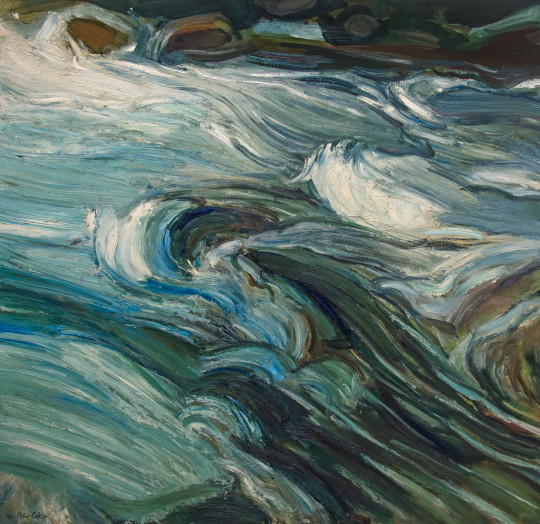
Peter Coker, RA (British, 1926-2004)
‘One of the foremost realist painters in England … Coker will be remembered for the refreshing nature of his astringent vision, for his consummate mastery as a draughtsman, painter and etcher, and as a proud and vigorous inheritor of a great artistic tradition.’ (Frances Spalding, Independent, 20 December 2004)
Peter Coker was born in London on 27 July 1926. He first studied at St Martin’s School of Art (1941-43; 1947-50), and began to exhibit regularly at the Royal Academy from 1950. Though he was a contemporary of John Bratby and Edward Middleditch at the Royal College of Art (1950-54), his work related only briefly to the raw figuration of the Kitchen Sink School. This was signalled by his paintings of a Leytonstone butcher’s shop which were included in his highly successful first solo show (Zwemmer Gallery 1956). His development as a landscape painter originated in his first encounter with the canvases of Gustave Courbet on a trip to Paris (1950). By the mid 1950s, he was an established landscapist in the French manner, working from the motif on the coasts of Normandy (1955) and Brittany (1957), and drawing inspiration from such contemporaries as Nicholas de Stäel. Later in the decade, he revived the spirit of Barbizon in his paintings of Epping.
Coker moved with his family to Manningtree in Essex (1962), and added occasional appearances at Colchester School of Art to teaching at St Martin’s. Nevertheless, he concentrated on his work, and made time for painting trips to France, the North of England and Scotland. He held solo shows at the Zwemmer Gallery (1960s), the Thackeray Gallery (1970s) and Gallery 10 (1980s), and continued to exhibit regularly at the Royal Academy. He was elected an Academician (ARA 1965, RA 1972), and had his early images of the butcher’s shop presented at the RA in one of an increasing number of public retrospectives (1979).
From 1972, Coker made several visits to Bargemon, Provence, during which he gradually accepted the character of the South of France, and integrated its startling light and colour into his established palette and handling. Late in the decade, he applied this approach to an ideal motif, in beginning a series of paintings of the garden of the Clos du Peyronnet, Menton. Following the death of his son Nicholas in 1985, he stayed at Badenscallie, Ross-shire, Scotland. There he began an impassioned series of landscapes, extended on subsequent visits, which focussed on salmon nets drying at Achiltibuie. These reaffirmed his essential identity as ‘a northern painter’, which had actually become more strongly emphasised by his contrasting achievement of painting the south. The many studies and paintings inspired by both Mediterranean France and the West of Scotland comprised important elements of such recent retrospectives as that of drawings and sketchbooks at the Fitzwilliam Museum (1989) and that of paintings and drawings at Abbot Hall Art Gallery (1992).
In October 2002, Chris Beetles mounted a major retrospective of the work of Peter Coker and, at the same time, launched the artist’s authorised biography. The beautifully produced hardback book, with over 250 illustrations, contains contributions from Richard Humphreys (Tate Gallery), John Russell Taylor (The Times), and David Wootton (Chris Beetles Ltd). The book includes a comprehensive biography and chronology, essays, appraisals of his work, a catalogue raisonné and lists of his exhibitions and sketchbooks.
While the monograph and retrospective were being planned, it seemed that the artist’s career might have been drawing to a close. However, the joint project revived his energies significantly. This was manifested by a range of new work, which was shown at Chris Beetles Ltd during spring 2004. The motifs are mostly familiar, being drawn from existing sketchbooks, and range across France and encompass Britain. Yet the handling was freer than ever, and the palette more vibrant – accomplishments of which Peter was justifiably proud. This display was complemented by an exhibition of recent Parisian subjects, touring to Gainsborough’s House, Sudbury, the Royal Academy of Arts, and the Graves Art Gallery, Sheffield.
Peter Coker died in Colchester, Essex, on 16 December 2004.
8 notes
·
View notes
Text
More OC, more lore, because when it comes to these two, you can't have one without the other. (at least not since they met)
Monica McKee
Biography
Monica McKee was born in Utopia Colony, Mars, the only child of Mark and Joanna McKee – a native-born Martian, which remains a rarity in the mid 22nd Century, and with the exception of trips to Earth to visit relatives and the four years of her university education, she has lived on Mars her entire life. Because there were few other children her age in the colony, she learned very early how to relate to others regardless of age or background, intuiting that similarities were more important than differences. Living in the colony put her in frequent contact with boomers and transport runners, and she found their stories of alien encounters a source of deep fascination.
She was present in Utopia Colony during the Terra Prime incident, an experience that galvanized her sense that humans could not afford xenophobia in the face of the larger galaxy. She watched the live coverage of Jonathan Archer’s speech to the Coalition of Planets conference and found it deeply moving (the next year the Utopia Colony high school would be renamed after him). Her pro-Coalition stance led to an argument with an uncle the next Thanksgiving that ended with her kicking him out of his own house, an outcome that amused her parents, but did not surprise them.
Following the outbreak of the Romulan War, many civilians on Mars relocated to Earth, either temporarily or permanently. Mark and Joanna were among the exodus, but Monica, now in her early twenties, chose to remain on Mars. She couldn’t see that Earth would be any safer in the grand scheme of an interplanetary war (pointing out that it was Earth that got attacked by the Xindi and not Mars tended to not go over well and she stopped after the first few times). She also felt that leaving would be an abandonment – Mars was home, and she couldn’t bring herself to leave. But the war turned Utopia Colony into something of a ghost town, and Monica found herself taking a job at one of the few businesses that hadn’t closed – a burger restaurant owned and operated by Mohammed Abdel, who was also unwilling to give up on Mars.
Monica found a home at Fat Mo’s, enjoying both the camaraderie and the work itself. In the years following the end of the war, the business flourished, particularly after Starfleet officially moved its shipbuilding facilities from Earth to an orbit above Utopia Colony. And in January of 2164, a homesick Starfleet captain, newly assigned to the Utopia Planitia Yards, stopped by the restaurant and sat at one of her tables. Her growing friendship with Captain Charles Tucker III would lead to her becoming acquainted with numerous Starfleet personnel, including a certain Andorian engineer…
Personality
Monica is, first and foremost, a people person. She is attentive, a good listener, and enjoys connecting with others, even if only in passing. Her cheerfulness and resiliency are the product of a childhood spent learning to be comfortable with her own company. Living in a place where others are frequently just passing through has instilled in her a deep curiosity about the lives of others. She is kind, accommodating, and generous, but also possesses a fierce sense of fairness, and has no time or patience for people who can't be decent to others. She is highly intelligent and not easily cowed or daunted, though she tends not to think of herself in those terms.
She is a talented sketch artist, but she would demure and call herself a dedicated amateur. She loves to dance, particularly early 20th century swing dancing, and is a regular at the dances held at the Grace Note club.
Relationships
Monica enjoys getting to know her customers, and especially her regulars, but few have had the impact on her life of Trip Tucker. During his time on Mars, their friendship quickly grew, her initial crush on him being immediately tempered by her recognition of his deep love for his wife and children. The more time he spent at Fat Mo's, both as a customer and as unofficial handyman, the more familial their relationship became, and Monica views him as the older brother she never had.
He also has a special place in her heart as the person who first introduced her to Commander Karveth, with whom she is very romantically involved. And if anyone has a problem with that, she really doesn’t care. An opinion like that doesn’t deserve her attention.
4 notes
·
View notes
Text
European liberals erupted into cheers in 2019 when the 45-year-old environmentalist and civil rights lawyer Zuzana Caputova was sworn in as Slovakia’s president. Even though she has fallen short of her ambitious goal of rooting out the persistent corruption and cronyism that course through Slovak society, she has chalked up many successes. These have earned her widespread popularity among Slovaks, who seemed to understand her project would always require more than one five-year term.
There’s just one problem: Caputova, facing new headwinds from the election of a new populist prime minister, has announced she’s not prepared to fight on.
Not only was Caputova the first-ever woman to hold the office, but her progressive, pro-European outlook and squeaky-clean biography stood out in a regional landscape stocked with ethnic nationalists, authoritarians, and other questionable operators. Caputova’s tough anticorruption platform was welcome relief to a country that had been rocked by graft, money laundering, and abuse of power scandals, as well as the contracted murder of a young journalist investigating organized crime.
In the course of her five-year term, the newcomer to elected office acquitted herself remarkably well, navigating Slovakia through the pandemic and then the war in Ukraine, a country with which it shares 60 miles of border to the east. Even as Slovakia’s southern neighbor, Hungary, prevaricated and obstructed transatlantic solidarity with Ukraine—a course many Slovak nationalists applauded—Caputova, suddenly head of a front-line state, stood fast. She has remained unflinchingly pro-Western even in the face of an acute energy crisis and hundreds of thousands of refugees.
Her mission to clean up the Slovakian state also notched impressive wins. Dozens of investigations were launched and cases opened up against figures linked to former governments—many of which led to convictions. In August 2023, Caputova—sometimes referred to as the Erin Brockovich of Slovakia—fired the country’s counterintelligence service chief for interfering in corruption investigations. But her anticorruption drive grew larger in scope when parliamentary elections in September 2023 reinstated Robert Fico, the former prime minister and pro-Russian, anti-American populist with the interests of himself and his associates always foremost in mind.
Many supporters expected that Caputova, as the principled, popular face of a new Slovakia, would soldier on for at least another term come elections in March 2024: to finish the job she had started. But Caputova’s tenure, she announced in June 2023, will come abruptly to an end. Her family’s well-being, she said, was behind her choice not to run again. “My decision is a personal one,” she said. “I am sorry if I disappoint those who expected my candidacy again.” In office, she had received multiple death threats, she said. A year earlier, she had already complained about “people who are threatening to kill me are using the vocabulary of some politicians. It does not only concern me, but also my loved ones.”
At the time of her announcement, Caputova polled as Slovakia’s most trusted politician. “I was surprised and disappointed when I heard the news,” said Pavol Demes of a German Marshall Fund fellow in Bratislava, who served as Slovakia’s foreign minister from 1991 to 1992. “Her track record proves that it was not coincidence that people elected her,” Demes said, adding that he believes Caputova would have prevailed again at the ballot box.
Others admit they’re more than just disappointed with Caputova’s “premature departure,” as the Slovak daily Dennik N put it. “Having an opportunity and not using it is literally a sin,” opined the Slovak newspaper Pravda, “especially if it is one that will never come again. … President Zuzana Caputova’s decision not to run can be considered a mistake. At a time when the chaos in Slovak politics has reached unprecedented proportions and the disillusionment among the population is great, the president bears even more responsibility for the fate of the country.”
In office, Caputova often punched back as hard as she was punched by her less principled opponents. She refused to let Fico, in the opposition since 2020, hound and bully her with impunity. In May 2023, she sued Fico for calling her an “American agent” and of “appointing Soros’ government,” referring to U.S. billionaire-philanthropist George Soros and the technocratic caretaker government she appointed in May 2023. Slovak authorities are still pursuing criminal cases involving dangerous threats made against the president.
Caputova’s aversion to the nastier aspects of Central European politics—in 1995 the son of the then-Slovak president was literally kidnapped—is understandable. But Caputova’s presence is all the more necessary today as Fico and his Smer-SD party are back in power and bent on returning Slovakia to its former incarnation. In just four months, Caputova has checked Fico several times. In October, for example, Caputova quashed the nomination of Rudolf Huliak as environment minister by the Slovak National Party, a Fico ally. Huliak, a nationalist, is known as a climate skeptic and opponent of LGBTQ+ rights.
She is currently weighing a veto of the Fico government’s move to dismantle the special prosecutor’s office—the body that handled the most serious corruption cases—and modify the criminal code, which triggered weeks of protests across Slovakia and rule-of-law concern from the EU. By weakening criminal sanctions for financial crimes, Fico could rescue the likes of Smer-allied oligarchs who would otherwise face prison sentences. One opposition politico charged that the law looks as if the mafia itself had written it. If her veto is overridden, which is likely, Caputova could take the issue to the Constitutional Court.
Caputova’s decision not to run thus opens the way for a multi-candidate race, the first round of which will be held on March 23 with, if necessary, a second in April. The vote is likely to come down to two candidates: National Council Speaker Peter Pellegrini, an on-again, off-again Fico ally; and Ivan Korcok, a liberal-minded former Slovak foreign minister and career diplomat. If Pellegrini triumphs, his victory will open the way for Fico to set in motion a pro-Russia political course that will greatly complicate the West’s defense of Ukraine, among other concerns.
Certainly, there would be no presidential corrective to hinder Fico in emulating his strongman counterpart next door in Hungary, Viktor Orban. Poland’s throwing off of its authoritarian leadership last year could have left Orban completely isolated in Central Europe. But Fico, though unlikely to amass the power of Orban’s Fidesz party or act so defiantly as Law and Justice Poland, sees Orban as a blood brother.
“Fico and his followers are fascinated by Orban’s method of governance since 2018,” Juraj Marusiak of the Slovak Academy of Sciences’ Institute of Political Science told Foreign Policy. “They see this authoritarianism as efficient and Orban as someone who takes care of his country’s national interests. This has made Orban creditable in Central Europe beyond Hungary alone.”
And Caputova’s bright light will be missed beyond diminutive Slovakia. Upon her election in 2019, a Hungarian acquaintance said to me that the only reason someone like Caputova could win in Central Europe is because she seemed to have no drawbacks at all: She was politically clean, charismatic, down to earth, and smart. And in office, she learned the ropes quickly. But she wasn’t perfect, apparently—no one could foresee that there would eventually be limits to her will to lock horns with Slovakia’s ruthless profiteers.
Sadly, there’s only one of her in the region. And soon, by her own choice, there will be none.
15 notes
·
View notes
Note
Bit of an odd question, but do you have a list of academic resources/a place to start researching about LMM and her views on WW1?
I'm going to be writing a research paper on Canada's views on war and how they changed from WW1 to WW2 and I remember Rilla of Ingleside and The Blythes are Quoted were some of LMM's most relevant wartime material, but I'm not sure where to start looking so if you could point me in the right direction that would be very helpful!
Btw, I do have academic access to articles right now, so paywalls are less of an issue if that matters.
I'll preface by tagging @gogandmagog who is our resident lucy maud montgomery expert <3 she'll probably be able to contribute here more than I will
I am thrilled to be asked this question because I love digging into stuff like this! I wish I had a photographic memory because I've recently come across quite a lot of material discussing LM Montgomery's attitudes toward the war, but I can't remember what it was specifically (AAH).
As far as fiction - yes, Rilla and TBAQ are the most directly related to the war. There are other novels that foreshadow it, such as Ingleside and Rainbow Valley. I just found out the other day that Rainbow Valley has in fact been argued to be an allegory for WWI (ie, Walter's fight with Dan Reese). In terms of nonfiction, I do remember some sources, and can offer some names for you to start digging into. Foremost LMM scholars, that sort of thing. I also tried to add in examples of the books/articles that I know specifically discuss the war, with relevant passages as examples. (note: these passages are just a few examples of many! As such they're just a starting point - answering the question thoroughly would require more of a deep dive 😄)
Mary Rubio: my impression is that she is THE scholar when it comes to LM Montgomery. She wrote a biography of LM Montgomery called The Gift of Wings, which discusses WWI and specifically talks about attitudes towards it (ie, the death of innocence or the death of religion caused by WWI), especially LMM. This will probably be the best resource for answering your question. It includes lm Montgomery's responses to interview questions about the war where she discusses her moral philosophy. However, it doesn't go into depth on WWII. See example below.

Elizabeth Epperly. Another LM Montgomery scholar. She wrote The Fragrance of Sweet Grass, which also touches on LM Montgomery's attitudes on the war. However, here is through the lens of LM Montgomery's fiction rather than biographical materials. (IE, analysis of how Walter represents WWI in the text, and how he reflects the "gallant knight" attitude towards the war). I just read this passage today for example:
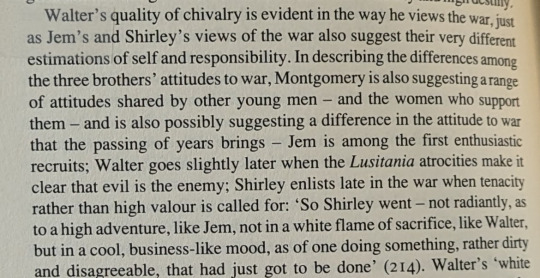
LM Montgomery's Journals. There are the selected, but I think the complete set would give you a fairer picture. They are organized by time period, so you would be able to select the ones from WWI and WWII if you wanted to. These are very detailed on the war to my understanding - much like Rilla, they go into specific battles etc. In fact, many lines in Rilla are directly copied from her journals, including ones belonging to Miss Oliver, Rilla, Walter, etc. You'd get primary source material and details if this is a heavy duty research paper. If it's not I'd probably rely on the other experts who have combed through the journals for you haha!
The Blythes Are Quoted. I recommend this one because it has a (short!) foreword by Epperly that specifically addresses this exact topic - see relevant passages from it below. This is the only source I found that really dug into WWII attitudes. Really, the thesis of this collection addresses the exact topic of your essay. It also has a short afterword by Benjamin Lefebvre (of Walter's Closet fame) that delves into LM Montgomery's ambivalence. The first two screenshots here are from the foreword and the last from the afterword.
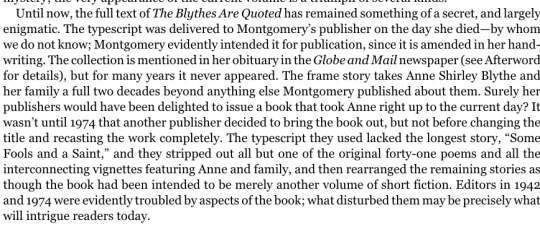
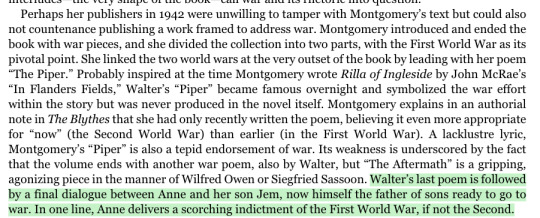
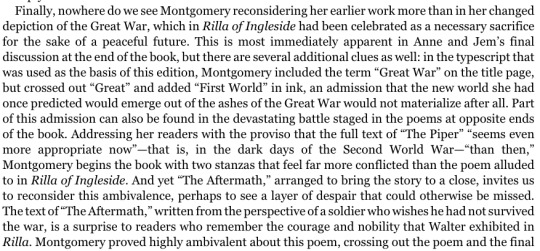
The LM Montgomery Institute. It has a citation database for secondary source material on LM Montgomery. It also runs the Maudcast, a podcast on LM Montgomery but I don't think that will have relevant information. It has the Journal of L.M. Montgomery Studies as well.
Good luck with your paper! It sounds fascinating!
25 notes
·
View notes
Text
Rules

Interacting
-As a matter of personal preference I would prefer to keep my interactions limited to writers who are at least 21 years old.
-I don’t mind if personals follow me, but please don’t reblog any of my threads or ooc posts. If it happens more than once you will be hard blocked. Any moodboards, music posts, etc are all up for grabs though. Go wild.
-Please don’t follow me if you are under 18. Minors will be soft blocked the first time. a second time will result in a hard block.
-I’m somewhat selective when it comes to writing partners and will be sticking to mutuals only for now.
-I’m VERY selective with OCs. If there isn’t some kind of biography or profile for your character, I’m not likely to follow back.
-Duplicates are great. I love seeing different takes on a character!
-I’m relatively flexible with writing style, but lean more towards literate multi-paragraph. Around 3-5 paragraphs is my sweet spot. Length-matching is not required.
-Please don’t hassle me for replies. While I do my best to stay on top of responses, they will not always be instantaneous. I have a full time job and full time anxiety so a measure of patience is appreciated.
-Feel free to reblog my asks, but. I won’t reblog yours unless your rules explicitly state that it’s ok.
-No Drama. None.
Plotting
-I like plot heavy threads and love coming up with in-depth plots and headcanons. Never be afraid to come to me with your ideas!
-I’m not a huge fan of fluff or slice of life threads on their own. Don’t get me wrong, I love feel-good content, but unless it’s part of a bigger story, the cutesy stuff will lose my interest pretty quickly.
Shipping and NSFW
-First and foremost, I will NOT write sexual content of any kind with minors or about minors.
-I won’t write smut scenes with muns under 21 period.
-Multi-ship friendly. This will be based on chemistry and will never assume a romantic relationship between our characters. If you are interested in shipping with Gojo, I am always happy to discuss it ooc.
-When it comes to sexual themes, I prefer there to be some kind of discussion beforehand. Like fluff, I’m not really into smut without a plot. Of course there is the occasional exception so, again, hit me up if you’d like to discuss it.
-Threads that do begin to take a nsfw turn will be tagged and under a read more. I’d prefer to take any explicit scenes to Discord or some other platform.
Other Content Warnings
-Canon typical violence and darker themes will be present on this blog. I am pretty good about tagging potential triggers but if there is anything I’ve missed please dm me and I’ll be sure to update accordingly. All I ask is that you not be a dick about it.
-I will try and keep organized tags for all my other content in order to keep a tidy dash for everyone.
Mun is 33, They/Them preferred, any pronouns acceptable
NOT SPOILER FREE
7 notes
·
View notes